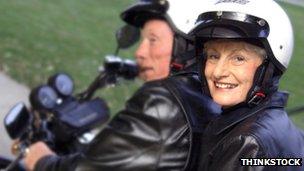Older motorcyclists 'more likely to be injured'
- Published

Motorcyclists over the age of 60 are three times more likely to be hospitalised after a crash than younger bikers, a US study suggests.
The report in the journal Injury Prevention found that serious chest and rib cage fractures were very common.
The authors suggest that reduced bone strength in older adults and their ability to buy more powerful bikes may play a part.
Motorbike groups in the UK say they have seen similar trends.
Nich Brown, from the Motorcycle Action Group, said: "The number of older motorcyclists in Britain has risen over the past decade - as has the number being injured. Although the numbers are much smaller than the US, the proportion of injury in each age group is similar.
"As well as an ageing population, the popularity of motorcycling among older riders with the time and cash to spend means more are returning to biking or taking it up for the first time - for the most part quite safely."
The study analysed data between 2001 to 2008 from the US National Electronic Injury Surveillance System-All Injury Program (NEISS-AIP) which collects information from 100 US hospitals which have an A&E.
During this period about 1.5 million adults over the age of 20 needed emergency treatment due to a motorcycle crash.
Bikers over the age of 60 were three times more likely to be admitted to hospital compared with those in their 20s and 30s - and two-and-a-half times more likely to sustain a serious injury.
The authors of the study said: "The greater severity of injuries among older adults may be due to the physiological changes that occur as the body ages, bone strength decreases, fat distribution may change and there is a decrease in the elasticity of the chest wall.
"Other factors such as a delayed reaction time, altered balance and worsening vision may also make older adults more prone to crashing."
They point out that underlying illnesses like cardiac disease, hypertension and diabetes may also increase the rise of complications.
'Keep skills up'
Data on motorbike size was not available to the researchers, but they suggested that older adults were more likely to buy bikes with larger engines - leading to more severe injuries.
Upper body fractures were more common in older adults while arm, shoulder and hand fractures were more likely in those that were younger.
This may be due to their faster reaction times - sticking their arms out to protect their fall, suggests Chris Hodder from the British Motorcyclists Federation.
He said: "There are fewer accidents here in the UK than the US - we've had a good rider training programme over the last 40-50 years - while in the US training has been a mixed picture due to its size and differences across states. Also drink-driving is a much bigger problem there.
"There are plenty of post-test courses in the UK. If you are coming back to motorcycling it would be good to look out for refresher training. Those that ride regularly should keep their skills up. If you have the money, high-quality chest protectors are also a good idea."
- Published3 February 2012
- Published12 February 2012